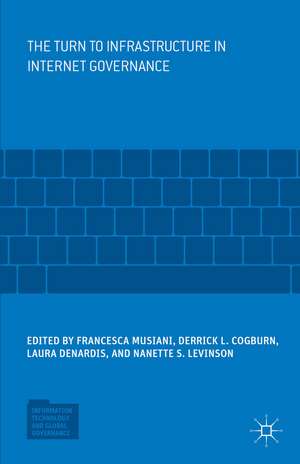The Turn to Infrastructure in Internet Governance: Information Technology and Global Governance
Editat de Francesca Musiani, Derrick L. Cogburn, Laura DeNardis, Nanette S. Levinsonen Limba Engleză Hardback – 8 dec 2015
Preț: 699.12 lei
Preț vechi: 822.50 lei
-15% Nou
Puncte Express: 1049
Preț estimativ în valută:
133.78€ • 143.05$ • 111.54£
133.78€ • 143.05$ • 111.54£
Carte tipărită la comandă
Livrare economică 17 aprilie-01 mai
Preluare comenzi: 021 569.72.76
Specificații
ISBN-13: 9781137533265
ISBN-10: 1137533269
Pagini: 288
Ilustrații: XVI, 268 p.
Dimensiuni: 140 x 216 x 18 mm
Greutate: 0.48 kg
Ediția:1st ed. 2015
Editura: Palgrave Macmillan US
Colecția Palgrave Macmillan
Seria Information Technology and Global Governance
Locul publicării:New York, United States
ISBN-10: 1137533269
Pagini: 288
Ilustrații: XVI, 268 p.
Dimensiuni: 140 x 216 x 18 mm
Greutate: 0.48 kg
Ediția:1st ed. 2015
Editura: Palgrave Macmillan US
Colecția Palgrave Macmillan
Seria Information Technology and Global Governance
Locul publicării:New York, United States
Cuprins
1. Governance by Infrastructure; Laura DeNardis and Francesca Musiani
2. The Multiple Logics of Post-Snowden Restructuring of Internet Governance; Derrick L. Cogburn
3. International Organizations and Global Internet Governance: Inter-Organizational Architecture; Nanette S. Levinson and Meryem Marzouki
4. Alternative Technologies as Alternative Institutions: The Case of the Domain Name System; Francesca Musiani
5. Domains of Control: Governance of and by the Domain Name System; Kenneth Merrill
6. Copyright, Information Intermediaries and Internet Architecture – Matthew Schruers
7. 'Three-Strikes' Response to Copyright Infringement: the Case of HADOPI; Primavera De Filippi and Danièle Bourcier
8. The Delegation of Censorship to the Private Sector; Nicolas Arpagian
9. Tracking Internet Shut Down Practices: Democracies and Hybrid Regimes; Patricia Vargas-Leon
10. The Turn to Infrastructure in Privacy Governance; Tatevik Sargsyan
11. Exploring PRISM's Spectrum: Privacy in the Information Age; John Laprise
12. Conclusion: The Next 'Turn' in Internet Infrastructure Governance; Nanette S. Levinson and Derrick L. Cogburn
2. The Multiple Logics of Post-Snowden Restructuring of Internet Governance; Derrick L. Cogburn
3. International Organizations and Global Internet Governance: Inter-Organizational Architecture; Nanette S. Levinson and Meryem Marzouki
4. Alternative Technologies as Alternative Institutions: The Case of the Domain Name System; Francesca Musiani
5. Domains of Control: Governance of and by the Domain Name System; Kenneth Merrill
6. Copyright, Information Intermediaries and Internet Architecture – Matthew Schruers
7. 'Three-Strikes' Response to Copyright Infringement: the Case of HADOPI; Primavera De Filippi and Danièle Bourcier
8. The Delegation of Censorship to the Private Sector; Nicolas Arpagian
9. Tracking Internet Shut Down Practices: Democracies and Hybrid Regimes; Patricia Vargas-Leon
10. The Turn to Infrastructure in Privacy Governance; Tatevik Sargsyan
11. Exploring PRISM's Spectrum: Privacy in the Information Age; John Laprise
12. Conclusion: The Next 'Turn' in Internet Infrastructure Governance; Nanette S. Levinson and Derrick L. Cogburn
Notă biografică
Francesca Musiani is a researcher with the French National Centre for Scientific Research and Associate researcher at the Centre for the Sociology of Innovation-MINES ParisTech-PSL. Francesca is a former Yahoo! Fellow in Residence at Georgetown University, USA and the recipient of the 2013 Informatique et Libertés Award of the French Privacy and Data Protection Commission, and currently a member of the French Parliamentary Commission on Law and Liberties in the Digital Age.
Derrick L. Cogburn is Associate Professor in the School of International Service at American University and a pioneer in the study of Information and Communication Technologies for Development (ICT4D) . He also serves as Executive Director of the Institute on Disability and Public Policy (IDPP) and the Collaboration Laboratory (COTELCO). He is a founding steering committee member of the Global Internet Governance Academic Network (GigaNet) and its former Vice Chair.
Laura DeNardis is Professor in the School of Communication at American University and a scholar of internet architecture and governance. The author of The Global War for Internet Governance (2014) and other books, her expertise has been featured in Science Magazine, The Economist, National Public Radio, New York Times, Time Magazine, Christian Science Monitor, Slate, Reuters, Forbes, The Atlantic, and the Wall Street Journal. She is a Senior Fellow of the Centre for International Governance Innovation and holds an international appointment as Research Director for the Global Commission on Internet Governance.
Nanette S. Levinson is Associate Professor at the School of International Service, American University and Senior Research Scientist with the Institute on Disability and Public Policy (IDPP). She is Academic Director for the SIS-Sciences Po Exchange Program. A former Chair of the Global Internet Governance Academic Network (GigaNet)and of the International Communication Section of the International Studies Association, her research and publications focuses on internet governance; technology and innovation policy; culture, communication and development; and social change.
Derrick L. Cogburn is Associate Professor in the School of International Service at American University and a pioneer in the study of Information and Communication Technologies for Development (ICT4D) . He also serves as Executive Director of the Institute on Disability and Public Policy (IDPP) and the Collaboration Laboratory (COTELCO). He is a founding steering committee member of the Global Internet Governance Academic Network (GigaNet) and its former Vice Chair.
Laura DeNardis is Professor in the School of Communication at American University and a scholar of internet architecture and governance. The author of The Global War for Internet Governance (2014) and other books, her expertise has been featured in Science Magazine, The Economist, National Public Radio, New York Times, Time Magazine, Christian Science Monitor, Slate, Reuters, Forbes, The Atlantic, and the Wall Street Journal. She is a Senior Fellow of the Centre for International Governance Innovation and holds an international appointment as Research Director for the Global Commission on Internet Governance.
Nanette S. Levinson is Associate Professor at the School of International Service, American University and Senior Research Scientist with the Institute on Disability and Public Policy (IDPP). She is Academic Director for the SIS-Sciences Po Exchange Program. A former Chair of the Global Internet Governance Academic Network (GigaNet)and of the International Communication Section of the International Studies Association, her research and publications focuses on internet governance; technology and innovation policy; culture, communication and development; and social change.
Textul de pe ultima copertă
This edited volume brings together experts from around the world to provide coverage and analysis of infrastructure's role in Internet governance, both now and in the future. Never in history have conflicts over Internet governance attracted such widespread attention. High-profile controversies include the disclosures about NSA surveillance by intelligence analyst Edward Snowden, controversy over a decision by the US government to relinquish its historic oversight of Internet names and numbers, and countless cybersecurity breaches involving unauthorized access to Internet users' personal data. Much of the Internet governance ecosystem—both technical architecture and coordinating institutions—is behind the scenes but increasingly carries significant public interest implications. An area once concealed in institutional and technological complexity is now rightly bracketed among other shared global issues—such as environmental protection and human rights—that have considerable global implications but are simply incongruous with national borders. This transformation into an era of global governance by Internet infrastructure presents a moment of opportunity for scholars to bring these politicized infrastructures to the foreground.

























